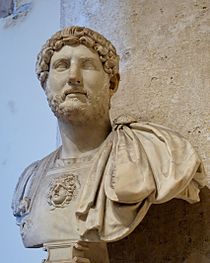Florus
As to whether these were composed by the same person, or set of people, is unclear, but the works are variously attributed to: The introduction to a dialogue called Virgilius orator an poeta is extant, in which the author (whose name is given as Publius Annius Florus) states that he was born in Africa, and at an early age took part in the literary contests on the Capitol instituted by Domitian.Having been refused a prize owing to the prejudice against North African provincials, he left Rome in disgust, and after travelling for some time, set up at Tarraco as a teacher of rhetoric.[4] He was once thought to have been "the first in order of a number of second-century North African writers who exercised a considerable influence on Latin literature, and also the first of the poetae neoterici or novelli (new-fashioned poets) of Hadrian's reign, whose special characteristic was the use of lighter and graceful meters (anapaestic and iambic dimeters), which had hitherto found little favour."[3] Since Cameron's article on the topic, however, the existence of such a school has been widely called into question, in part because the remnants of all poets supposedly involved are too scantily attested for any definitive judgment.The work, which is called Epitome de T. Livio Bellorum omnium annorum DCC Libri duo, is written in a bombastic and rhetorical style – a panegyric of the greatness of Rome, the life of which is divided into the periods of infancy, youth and manhood.According to Edward Forster, Florus' history is largely politically unbiased, except when discussing the civil wars where he favours Caesar over Pompey.[7] Florus has taken some criticism on his writing due to inaccuracies found chronologically and geographically in his stories,[4] but even so, the Epitome of Roman History was vastly popular during the late Antiquity and the Middle Ages, as well as being used as a school book until the 19th century.

Florus (disambiguation)cognomenrhetoricianhistorianTrajanHadrianAfricaCapitolDomitianTarracoAelius Spartianuspoetae neotericiE. Bahrenstrochaic septenariusdactylic hexametersPervigilium VenerisFranz EyssenhardtFriedrich MarxAb Urbe Condita LibriGates of JanusAugustusVirgilLoeb Classical LibraryChristopher PlantinJulius SecundusQuintilianTreviriTiberiusArmeniaTacitusWikisourceAnnia genspublic domainChisholm, HughEncyclopædia BritannicaJona Lendering